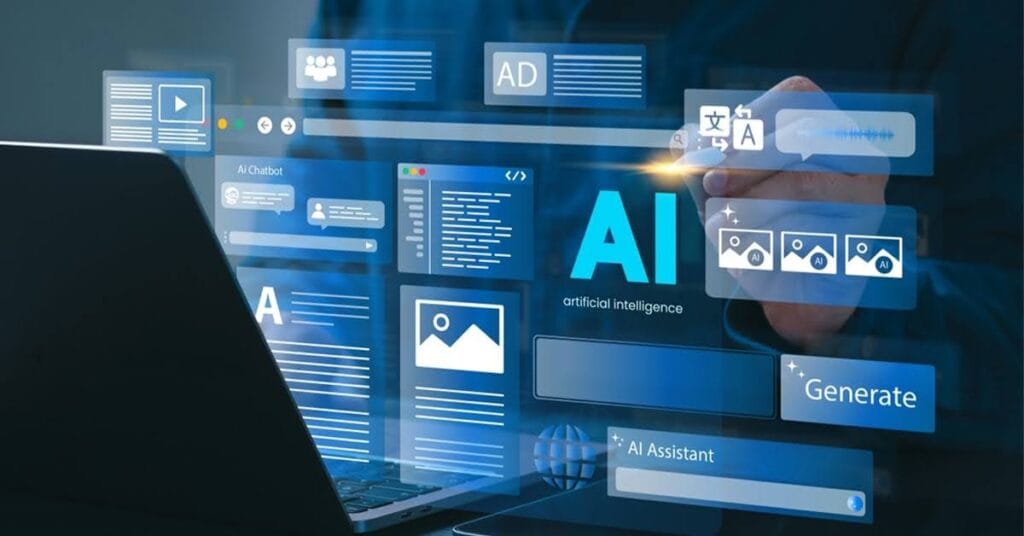Imagine having a tool that can craft content for you, matching your brand’s tone perfectly, and doing it just the way you’d want. That’s exactly what generative AI for marketing is bringing to the table for marketers right now—helping them create content with ease while still keeping the brand’s voice intact.
The market in the field of generative AI for marketing is also on the rise, as Statista predicts that the global market size will be over $66 billion in 2024. The rise of AI development companies has led organizations to race to include this technology in their marketing strategies. Now that we understand generative AI for marketing and how it works, let’s explore its uses.
Why Generative AI for Marketing is a Game Changer for Marketers
Generative AI for marketing helps organizations save time while scaling content and generating high-quality output. From blog post writing to the caption you want to accompany your post or even an email marketing campaign, generative AI for marketing is making it easier than ever to produce relevant content.
The beauty of generative AI for marketing is that it can create marketing messages that were impossible before. Today’s customers are unique and expect to be treated as such, and that is precisely what they get when interacting with AI. It also means that AI can use the data it has collected from users to create tailored marketing messages, ensuring high customer engagement and delight.
The generative AI for marketing market is estimated to reach $1.3 trillion by 2032, and its applications span across Digital Advertising, AI Content Creation, and Conversational AI.
Marketing Use Case of Generative AI for Marketing
Here’s a breakdown of the most exciting ways marketers apply generative AI for marketing:
- Content Creation
Sites like ChatGPT, Copy.ai, and Jasper have shifted the paradigm. These platforms produce blog posts, social media posts, video scripts, and even the script for an advertisement. They identify tone, voice, and audience preferences, allowing brands to outsource content creation to AI platforms.
- Personalization
While personalization is not new, generative AI for marketing is the most sophisticated method yet. AI tools can analyze vast amounts of user data and create content that most appeals to customers, enhancing the customer experience.
- Ad Campaign Optimization
Generative AI for marketing is not just limited to content creation; it also assists in optimizing entire advertisements. AI can automate A/B testing, track performance in real-time, and adjust campaigns as needed. This dynamic approach ensures ads reach the right audience with the right message, boosting CTR and ROI.
According to Gartner, businesses implementing AI for ad optimization will experience a 30% campaign enhancement by 2025.
- Use of Chatbots
AI-powered chatbots are transforming customer service. Brands like Sephora and H&M use AI chatbots to engage customers, offer product suggestions, answer queries, and even assist with purchases.
How Generative AI for Marketing Increases Engagement and Conversions
AI helps marketers improve engagement and conversions through generative AI for marketing by creating content that resonates with target audiences. This, in turn, boosts engagement rates, such as email open and click-through rates.
For instance, Deloitte’s studies show that 94% of business executives believe that AI will be a primary driver of business success, and marketing is no exception.
AI ensures the right message reaches customers at the right time. Whether it’s an email marketing message or an ad that adapts based on user actions, generative AI for marketing enhances conversion rates. With proper AI application, conversion rates can improve by as much as 20%.
Possible Disadvantages of AI Writing
While generative AI for marketing is promising, it’s important to recognize some potential disadvantages:
- Lack of Human Touch
Despite its capabilities, AI lacks the emotional and creative depth that human writers bring to content. This can result in content that feels mechanical or unemotional, which may not resonate with all audiences.
- Ethical and Data Privacy Concerns
Data is the foundation of generative AI, but it also raises privacy concerns. Companies must comply with laws such as GDPR or CCPA, ensuring transparency and ethical use of customer data.
- Risk of Homogeneity
Since AI generates content based on historical data, it may lead to repetitive or cliché material. If all companies use AI, content could start to look the same, diminishing its impact.
- Dependence on Quality Input
AI’s output is only as strong as the data it’s fed. If the input data is flawed or biased, the output will be too. Human oversight is essential to ensure content aligns with brand values and engages the target audience.
Generative AI for Marketing: The Future
The integration of generative AI for marketing is here to stay. As the generative AI market is expected to reach $1.3 trillion by 2032, businesses that do not adapt may fall behind. The future lies in finding the perfect blend of AI and human elements in marketing.
Wrapping Up
Generative AI for marketing is rapidly gaining traction and becoming a core part of marketing strategies. It allows brands to create more content, personalize customer interactions, and target ads more effectively. The best marketing strategies will integrate AI while maintaining the human touch that customers still value.
Partner with AI experts like Xaigi to seamlessly integrate generative AI for marketing into your business. With our expertise, you can unlock the full potential of AI for content creation, ad optimization, and customer engagement. Ready to elevate your marketing strategy? Contact us today to begin your AI journey!


